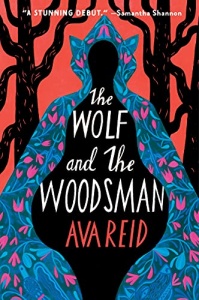
Amazon Cover
The Wolf and the Woodsman by Ava Reid
BOOK BLURB ON AMAZON
In her forest-veiled pagan village, Évike is the only woman without power, making her an outcast clearly abandoned by the gods. The villagers blame her corrupted bloodline—her father was a Yehuli man, one of the much-loathed servants of the fanatical king. When soldiers arrive from the Holy Order of Woodsmen to claim a pagan girl for the king’s blood sacrifice, Évike is betrayed by her fellow villagers and surrendered.
But when monsters attack the Woodsmen and their captive en route, slaughtering everyone but Évike and the cold, one-eyed captain, they have no choice but to rely on each other. Except he’s no ordinary Woodsman—he’s the disgraced prince, Gáspár Bárány, whose father needs pagan magic to consolidate his power. Gáspár fears that his cruelly zealous brother plans to seize the throne and instigate a violent reign that would damn the pagans and the Yehuli alike. As the son of a reviled foreign queen, Gáspár understands what it’s like to be an outcast, and he and Évike make a tenuous pact to stop his brother.
As their mission takes them from the bitter northern tundra to the smog-choked capital, their mutual loathing slowly turns to affection, bound by a shared history of alienation and oppression. However, trust can easily turn to betrayal, and as Évike reconnects with her estranged father and discovers her own hidden magic, she and Gáspár need to decide whose side they’re on, and what they’re willing to give up for a nation that never cared for them at all.
MY REVIEW
A vivid new world splicing together fairy tales, legends, history, and mythology from cultures usually not appearing in “typical” American storytelling. Both fantasy and romance, the story centers around Evike and Gaspar – the wolf and the woodsman.
The enemy-to-friends romance is at times naked, ugly, sweet, heartbreaking, fated, and impossible.
The fantasy world captures why the “woods” are dangerous beyond imagination, and the tyranny has shades where “it could be worse” allows acceptance of the unsustainable.
Faith and history clash and mesh depending on the day and person. The impact of refuge relocation and treaty marriages leaves children behind who must live with the strange guilt of those raising them – who both hate their mixed blood and have an obligation to raise it anyway.
A complicated, wonderous world, the Wolf and the Woodsman makes a worthy read.